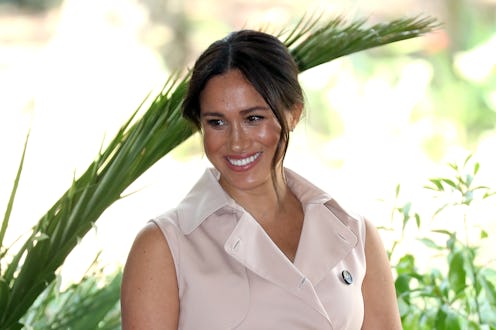(Living)
The Crucial Mental Health Takeaway Meghan Markle Spoke To In ‘Harry and Meghan: An African Journey’

There was plenty of conversation fodder to glean from the revealing documentary Harry and Meghan: An African Journey. The typically private and diplomatic royal couple let cameras behind the scenes on a transformative trip to South Africa and touched on a number of topics including family conflict, the complications of living in the public eye, and emotional stability (or lack thereof). It was, in fact, the latter that truly hit home via a poignant mental health revelation by Meghan Markle herself.
It’s no secret the Duchess of Sussex has been a hot topic of conversation for years now, with global press outlets speculating on everything, including her personal style, non-traditional royal wedding, family relationships, and marriage as a whole. It seems even the most sacred and personal aspects of one’s life are up for discussion when it comes to the Markle and Prince Harry — so it’s only natural that the pressure has taken its toll on the former Suits actor. "Look, any woman, especially when they’re pregnant, you’re really vulnerable," said the new mother when filmmaker Tom Bradby inquired about how she was faring amidst the media storm. "So that was made really challenging. And then, when you have a newborn ... especially as a woman, it’s a lot." What followed was a seemingly simple yet crucial statement that shed some light on a mental health factor that perhaps isn’t considered or talked about enough. "And also, thank you for asking, because not many people have asked if I’m OK,” said the Duchess. “But it’s a very real thing to be going through behind the scenes." Yes, Markle revealed her gratitude for someone simply asking her how she was doing.
Now, there’s been some debate and speculation on the effectiveness of specifically asking someone if they are OK. Some would say the generic question is, well, generic and a weak attempt at offering support to someone who is clearly hurting or going through something incredibly difficult and life-altering. Fair enough. However, a 2017 study found that the likelihood of depression in the past year can be reduced with high-quality social connection. In yet another 2014 study by the Journal Of Research In Medical Sciences, external “social support” from friends and family was said to be an evidenced protective factor for coping with depression and anxiety. (Also, this is not to assume the Duchess of Sussex is specifically dealing with either of these issues at the moment.)
Now, to be clear, conditions like depression and anxiety are very serious and not to be taken lightly and can sometimes require the help of a medical or licensed professional. Obviously, simply checking in with a friend who's hurting or in emotional discord will most likely not be a cure-all that catapults them to a healthier and happier state. However, acknowledging their difficult circumstance and pain can, at the very least, be impactful in allowing them to feel seen and understood. It also can create space for them to vocalize their emotions and feelings — so be prepared to listen.
Targeted statements, like “Do you want to talk about it? I’m here if you do”, “How can I help you?”, and “How are you managing with [enter issue or scenario here]?” Getting as specific as possible with your support questions could be helpful in showing you listen and care about both the overall state of your loved one’s mental health as well as the details involved. As Markle so openly explained, simply feeling considered can make a difference in someone’s day. Food for thought.